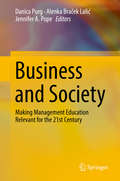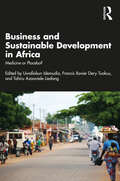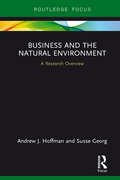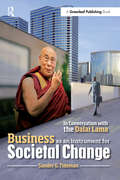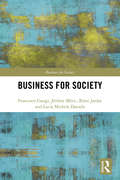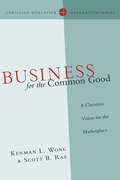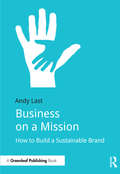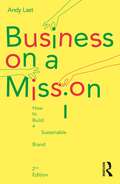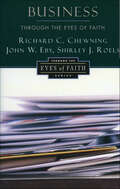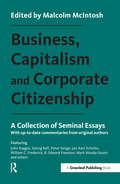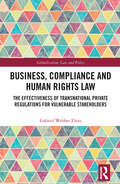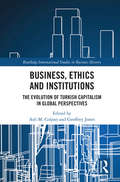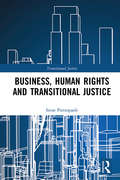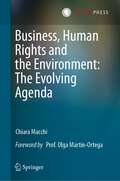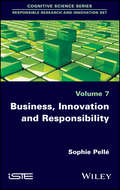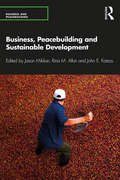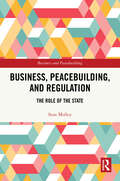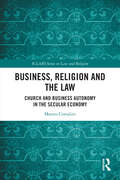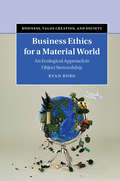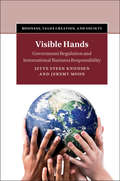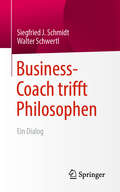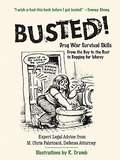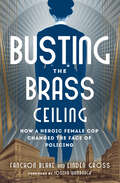- Table View
- List View
Business and Society: Making Management Education Relevant for the 21st Century
by Danica Purg Alenka Braček Lalić Jennifer A. PopeThe world of business is constantly evolving and management education institutions will likely face a number of challenges in keeping up with these changes. While most books focus on the needs of management education institutions, this work addresses the needs of the corporate world in the era of the Fourth Industrial Revolution. Featuring an extensive research study spanning 11 countries, it offers a unique perspective on the business challenges and developmental needs of companies in emerging and recently emerged economies, and on the missing links between those needs and management education. Using both company-specific and country-level data, the book provides businesses and educators with rare insights and recommendations on strengthening existing partnerships (or establishing them anew) between management education institutions and the corporate sector in order to make management education relevant for the 21st century. The book argues that ‘relevance’ should take the center-stage of all higher education institutions in order to accomplish their third mission, namely service to society. This is especially important for management education institutions, whose mission is to mold future managers and leaders who can have a significant influence on economic success and the wellbeing of society.
Business and Sustainable Development in Africa: Medicine or Placebo?
by Uwafiokun Idemudia, Francis Xavier Dery Tuokuu, and Tahiru Azaaviele LiedongThe book offers new critical insights into the relationship between corporate social responsibility (CSR) and sustainable development in Africa. The extent to which CSR initiatives can contribute to sustainable development in Africa remains debatable. This book examines in a very clear structure how, when, and whether CSR initiatives are able to contribute to the realization of the sustainable development goals, peace, and environmental sustainability at the micro-levels of society. It also explores some macro-level issues such as the relationship between taxation and CSR, CSR and human rights, and CSR and public governance and, in so doing, challenges existing CSR dogmas. With themes aligned with the UN Sustainable Development Goals (SDGs), this book provides useful practical guidance for policymakers and business leaders seeking to better understand the strength and limitations of CSR as a vehicle for advancing sustainable development in Africa. It will also appeal to scholars, researchers, and students of African studies, development studies, international business, strategic management, and business and society.
Business and the Natural Environment: A Research Overview (State of the Art in Business Research)
by Andrew J. Hoffman Susse GeorgThe fields of corporate environmentalism, green business and corporate sustainability have grown significantly over the past twenty-five years, such that the academic research domains of business decision-making, accounting, organizational behaviour, and the protection of the natural environment have developed into maturing areas of study within the management sciences. Business and the Natural Environment: A Research Overview is a summary of the research thus far on this topic, offering a structure for understanding its emergence and growth, the multiple facets that make up its present state and a glimpse into the future of where it may be going. Along the way, the authors provide a compendium of its important works to help situate the interested reader in the landscape of the field. One important element of this work is its topical relevance; issues of environmental protection (and more recently sustainability) are critically important in today’s worlds of business, policy, and public understanding. Scholars who choose to enter this domain have much to offer of societal value while at the same time, entering a non-fully legitimate research stream that can lead to academic success (such as tenure). This shortform book provides a research map for both new scholars who wish to enter the field and more seasoned researchers who wish to understand one view of the landscape and how they might fit within it. This expert survey of the existing literature brings the research story into the age of the Anthropocene and is essential primary reading.
Business as an Instrument for Societal Change: In Conversation with the Dalai Lama
by Sander TidemanBusiness as an Instrument for Societal Change: In Conversation with the Dalai Lama is the result of two decades of research and dialogue with His Holiness the Dalai Lama and other leaders in business, government, science and education. Author Sander Tideman, a lawyer and banker who has maintained a friendship with the Dalai Lama over all these years, presents a practical framework and methodology to develop a new kind of leadership - one fit to repurpose the business world and tackle escalating social, economic and environmental needs. The Dalai Lama rarely speaks directly on the topics of business, leadership and economics. Yet in the dialogues recounted here, his wisdom - combined with key insights from business and public leaders -creates a unified shift towards a consciousness of interconnectedness, offering profound insights for practitioners and general readers alike. Tideman unites the scientific worldviews of physics, neuroscience and economics with the positive psychology of human relationships, and ancient spiritual wisdom, to formulate practical business leadership solutions. While recognizing the need for change in external structures and governance, Tideman highlights the importance of opening our minds, and connecting inner and outer spirituality. At the same time, he focuses on concrete practices for winning the hearts and minds of employees, customers, communities, and society at large, while addressing deep-rooted problems such as extreme social inequality and continued financial collapses. At the heart of this book lies the journey to discover our shared purpose. This ignites new sources of value creation for the organisation, customers and society, which Tideman terms 'triple value'. We can achieve triple value by aligning societal and business needs, based on the fundamental reality of interconnection. Business as an Instrument for Societal Change: In Conversation with the Dalai Lama is a readable and intelligent exploration of how leaders can actually help to shape a sustainable global economy by embracing innate human and humane behaviour. It is also Tideman's fascinating personal journey, which brought him to question the underlying motivations and goals of business leadership and to seek a new paradigm for a more sustainable approach. Reflecting Tideman's sharp perceptions and infused with the Dalai Lama's unmistakable joy, this book has the power to change your way of thinking.
Business for Society
by Jérôme Méric Lucia Michela Daniele Rémi Jardat Francesco GangiThis book is about promoting corporate responsibility in its original meaning: businesses should have a positive impact on society, and society should not only be a lever of making a profit. When we treat social responsibility as an external function of the core business, we are exposed to the worst. Business for Society seeks to redress the balance and promotes the original idea of corporate responsibility. This first book in the series of the same name sets the scene and presents the key theories across the various management disciplines to answer the following questions: ‘How, why and under what conditions can business act for society?’ The book narrows and discusses examples of businesses which are making impressive strides in delivering positive impacts for society as well as their bottom lines; but as the concept of corporate responsibility has become more mainstream in recent years, many organisations have adopted the term and reduced it to a marketing message. Areas covered include a historical perspective on the hijacking of business responsibility towards society, management knowledge and value, the Business for Society project against hijacking, accounting for society, finance for society and governance for society and democracy. The book will be of interest for scholars and students in the fields of corporate social responsibility, business ethics and governance.
Business for the Common Good: A Christian Vision for the Marketplace (Christian Worldview Integration Series)
by Scott B. Rae Kenman L. WongIs business just a way to make money? Or can the marketplace a venue for service to others? Scott B. Rae and Kenman L. Wong seek to explore this and other critical business issues from a uniquely Christian perspective, offering up a vision for work and service that is theologically grounded and practically oriented. Among the specific questions they address along the way are these: What implications does the Christian story have for the vision, mission or sense of purpose that shapes business engagement? What parts of business can be affirmed and practiced "as is" and what parts need to be rejected or transformed? What challenges exist as attempts are made to live out Christian ideals in a broken world characterized by tight margins, fierce competition and short-term investor pressures? How do Christian values inform specific functional areas of business such as the management of people, marketing and environmental sustainability? Business can be even more than an environment through which individual Christians grow in Christlikeness. In this book you'll discover how it can also be a means toward serving the common good.
Business on a Mission: How to Build a Sustainable Brand
by Andy LastBronze winner of the AXIOM Business Book Award in the category of Philanthropy, Non-Profit, Sustainability. Please see: http://www.axiomawards.com/77/award-winners/2017-winners This easy-to-read and engaging book is the perfect introduction to how to build a sustainable brand for your organization. Intended as a roadmap that can be readily applied by busy managers and practitioners, the book includes interviews with business leaders, including Paul Polman of Unilever, Adam Elman of Marks & Spencer, and Jonas Prising of ManpowerGroup to provide insight into best practice and clear guidance for implementation. Throughout, the book avoids jargon and theorizing to ensure readability. Business on a Mission is based on more than a decade working with some of the first businesses to develop social missions and shows the foundations behind their success. It looks at how businesses can profit from working hand in hand with society and identifies a model for success. The book demonstrates how businesses can go from hiding behind "social shields" to picking up "social swords" and presents the six criteria to look for in assessing a social mission. It also focuses on how good communications can build trust and bring about positive change; and it provides clear ways to engage employees and improve productivity as well as "rules" for communicating social missions externally. This optimistic book explains the benefits of partnerships in the sustainable development agenda, particularly between businesses and NGOs. The book features guidelines for avoiding dysfunctional partnerships, and presents interviews with Marc Van Ameringen, Executive Director of GAIN (Global Alliance for Improved Nutrition) 2005 to 2016, and Myriam Sidibe, Social Mission Director for Africa, Unilever, on how things can be managed to the benefit of both partners. .
Business on a Mission: How to Build a Sustainable Brand
by Andy LastBusiness on a Mission is a simple to follow guide for how organisations can adapt to the changing world and evolving expectations of stakeholders to build more purpose-led, sustainable businesses. It features proven models and case study examples of how to create a brand that talks to the emerging Gen Z consumer base; how to use social missions to drive sales in retail and with B2B customers; how to preserve reputation and licence to operate by working in partnership with not-for-profit organisations; and how to attract and retain the best talent by demonstrating a genuine social purpose. As well as clear, applicable models and behind-the-scenes descriptions of how successful campaigns were built and sustainable change made, this book features candid interviews with change makers from the worlds of retail, professional services, consumer goods, and NGOs. This second edition looks at how businesses and brands like Dove are now linking social and environmental goals, with an exclusive interview with Unilever CEO, Alan Jope. It explores how investors are now driving a systemic change in focus in the boardroom towards the sustainability agenda, and how leaders can respond to this, featuring a new interview with Frank Cooper, Global Chief Marketing Officer and member of the Global Executive Committee at BlackRock. The impact of the pandemic on what it means to be a sustainable brand, including a focus on sustainable supply chains, the growing power of Gen Z, the growth of online purchasing, multi-stakeholder partnerships, increased regulation, and culture at work, is also explored. This book has been read, enjoyed, and used by business leaders to identify models for change; by managers to create progressive campaigns; by NGOs to create stronger partnerships with the private sector; and by students to learn how theories of social purpose and sustainability can be applied in the real world. The first edition was Bronze winner of the AXIOM Business Book Award in the category of Philanthropy, Non-Profit, Sustainability.
Business through the Eyes of Faith (Through the Eyes of Faith)
by Richard C. Chewning John W. Eby Shirley J. RoelsIs capitalism Christian? Is there a Christian perspective on business? How should a Christian use power in the workplace? In addressing such difficult questions as these, Business Through the Eyes of Faith demonstrates how God can dwell at the center of one's life even in the secular marketplace.Here is pragmatic affirmation of the role that committed Christians can play in the business world. The authors stress the connections between Christian principles and good management and provide biblical passages that support their principles and relate them to the practical issues faced by Christian managers. Issues such as employee motivation, workplace communication, business leadership, the role of profit, and social responsibility are all addressed in concrete terms and reinforced by short vignettes, suggested biblical passages to explore, and commentaries from contemporary theorists and practitioners.Business Through the Eyes of Faith shows that business can and should be a reflection of God's kingdom. It is an invaluable resource for Christian business students, managers, and those who wish to understand the concerns and motives of Christians in the business world.
Business, Capitalism and Corporate Citizenship: A Collection of Seminal Essays
by Malcolm McIntoshIn the first decades of the twenty-first century, the theory and practice of corporate citizenship and responsibility adapted significantly. The pieces in this volume capture the essence of these changes, with illuminating reflections by their preeminent authors on success, failure, learning and progress. Featuring contributions from John Ruggie, Peter Senge, R. Edward Freeman, Jan Aart Scholte and Georg Kell, it charts the rise of corporate citizenship, sustainability and corporate social responsibility. This title is one of a two-volume set: a collection of seminal and thought-provoking essays, drawn from the Journal of Corporate Citizenship’s archive, accompanied by new analysis and reflection from the original authors. Written by some of the most widely recognized academic and business pioneers and leaders of the corporate responsibility and global sustainability movement, the volumes make essential reference texts for anyone interested in the radically awakening new global political economy. The Journal of Corporate Citizenship was launched in 2001 by Founding Editor Malcolm McIntosh and Greenleaf Publishing. Today, it continues to fulfil its mission to integrate theory and practice and provide a home for enlightened transdisciplinary thinking on the role of business and organizations in society.
Business, Compliance and Human Rights Law: The Effectiveness of Transnational Private Regulations for Vulnerable Stakeholders (Globalization: Law and Policy)
by Gabriel Webber ZieroIn recent years, sustainability-related certifications and labels, which are based on Transnational Private Regulations (TPRs), have gained in importance in the areas of business and human rights, particularly from a consumer point of view. However, some question whether companies adhering and complying with TPRs’ normative frameworks are able to effectively meet the expectations deriving from international human rights standards. In response to this question, this book proposes an analytical concept of effective compliance. Based on the elements identified as crucial for achieving effective compliance, it conducts an in-depth analysis of how TPRs’ normative frameworks function in practice and identifies common patterns and challenges. Such inquiry is based on an interdisciplinary methodological approach between law and sociology, seeking not only to comprehend and assess how law is systematised in theoretical terms, but also to understand how it works on the ground. This allows identification of the lack of active and effective participation of vulnerable stakeholders in the discursive processes established and governed by TPRs, such as rule-making and conformity assessment processes, as the main challenge. Based on such evidence, the book addresses the possibilities of overcoming such challenges, proposing that to fully achieve TPRs’ potential from an effective compliance point of view, legal empowerment of vulnerable groups is essential. It concludes by providing key observations and suggestions that contribute to the use of TPRs as instruments in the struggle for rights of empowered vulnerable stakeholders. The book will be of interest to academics, researchers and policy-makers working in the areas of international law, transnational law, sociology of law and human rights law.
Business, Ethics and Institutions: The Evolution of Turkish Capitalism in Global Perspectives (Routledge International Studies in Business History)
by Geoffrey G. Jones Asli M. ColpanThis book is the first systematic scholarly study on the business history of Turkey from the nineteenth century until the present. It aims to place the distinctive characteristics of capitalism in Turkey within a global and comparative perspective, dealing with three related issues. First, it examines the institutional context that shaped the capitalist development in Turkey. Second, it focuses on the corporate actors, entrepreneurs and business enterprises that have led the national economic growth. Third, it explores the ethical foundations and social responsibility of business enterprises in the country. The comparative and historical approach sets the volume apart from previous books on the subject. Business, Ethics and Institutions aims to strengthen scholarly and policy understanding of Turkish capitalism and the diversified business groups which dominate the economy by providing a deep analysis of the evolution of political and social institutions which shaped corporate activity. It demonstrates the key role played by large family-owned business groups in Turkey’s development. It also seeks to identify both the similarities and the differences in the Turkish pattern of economic development, making comparisons with Japan, an early example of catch-up, and a more successful model than Turkey. The comparative perspective makes the book highly relevant to a wide range of scholars interested in the institutional foundations of modern capitalism and will be of value to researchers, academics, and students in the fields of business and economic history, ethics, organizational studies, and entrepreneurship.
Business, Human Rights and Transitional Justice
by Irene PietropaoliThis book considers the efficacy of transitional justice mechanisms in response to corporate human rights abuses. Corporations and other business enterprises often operate in countries affected by conflict or repressive regimes. As such, they may become involved in human rights violations and crimes under international law ‒ either as the main perpetrators or as accomplices by aiding and abetting government actors. Transitional justice mechanisms, such as trials, truth commissions, and reparations, have usually focused on abuses by state authorities or by non-state actors directly connected to the state, such as paramilitary groups. Innovative transitional justice mechanisms have, however, now started to address corporate accountability for human rights abuses and crimes under international law and have attempted to provide redress for victims. This book analyzes this development, assessing how transitional justice can provide remedies for corporate human rights abuses and crimes under international law. Canvassing a broad range of literature relating to international criminal law mechanisms, regional human rights systems, domestic courts, truth and reconciliation commissions, and land restitution programmes, this book evaluates the limitations and potential of each mechanism. Acknowledging the limited extent to which transitional justice has been able to effectively tackle the role of corporations in human rights violations and international crimes, this book nevertheless points the way towards greater engagement with corporate accountability as part of transitional justice. A valuable contribution to the literature on transitional justice and on business and human rights, this book will appeal to scholars, researchers and PhD students in these areas, as well as lawyers and other practitioners working on corporate accountability and transitional justice.
Business, Human Rights and the Environment: The Evolving Agenda
by Chiara MacchiMore than ten years after the adoption of the UN Guiding Principles on Business and Human Rights, this book critically reviews the achievements, limits and next frontiers of business and human rights following the ‘protect, respect, remedy’ trichotomy. The UN Guiding Principles acted as a catalyst for hitherto unprecedented regulatory and judicial developments. The monograph by Macchi proposes a functionalist reading of the state’s duty to regulate the transnational activities of corporations in order to protect human rights and adopts a holistic approach to the corporate responsibility to respect, arguing that environmental and climate due diligence are inherent dimensions of human rights due diligence. In the volume emerging legislations are assessed on mandatory human rights and environmental due diligence, as well as the potential and limitations of a binding international treaty on business and human rights. The book also reviews groundbreaking litigation against transnational corporations, such as Lungowe v. Vedanta or Milieudefensie v. Shell, for their human rights and climate change impacts. The book is primarily targeted at academic and non-academic legal experts, as well as at researchers and students looking at business and human rights issues through the lenses of legal studies (particularly international law and European law), political sciences, business ethics, and management. Additionally, it should also find a readership among practitioners working in the public or private sector (consultants, CSR officers, legal officers, etc.) willing to familiarize themselves with the expanding areas of liability, financial and reputational risks connected to the social and environmental impacts of global supply chains.Chiara Macchi is currently Lecturer in Law at Wageningen University & Research in The Netherlands.
Business, Innovation and Responsibility
by Sophie PelléResponsible Innovation. For some, this expression is only an oxymoron or, worse, a means of masking with a sheet of virtue economic practices that would otherwise appear selfish and self-interested. For others, theorists and actors of innovation, this expression represents a formidable lever of action and a rich conceptual source from which to draw new ways of innovating. The articulation between different levels of norms – economic and ethical, to which we can add the legal dimension – is not new, and is the subject of an in-depth reflection, decades old, around the idea of Corporate Social Responsibility (CSR). By taking up some debates on CSR, most of which are foreign to the current authors of responsible innovation, this book examines the various justifications that CSR brings in order to convince economic players, subject to powerful market forces, of their responsible commitment. But these are not enough. The book also explores the specific contribution of the concept of responsible innovation to coping with the technological, social and political breakthroughs generated by innovation, and is based on philosophical resources such as the ethics of virtue and the ethics of “care”.
Business, Integrity, and Peace
by Timothy L. FortEthical business behavior has an unexpected payoff: it reduces the likelihood of violence. This insight forms the basis of Business, Integrity, and Peace, first published in 2007. Academic and popular interest in the topics of corporate responsibility and 'peace through commerce' has surged. This book demonstrates that the adoption of generally accepted ethical business practices does not require wholesale changes in corporate governance. It does require, however, the development of more reflexive and self-regulating models of corporate decision-making, drawing upon three strands of existing corporate responsibility approaches: the legal, the managerial, and the aesthetic. Fort introduces the concept of Total Integrity Management, providing an integrative framework that transcends disciplinary boundaries to create ethical corporate cultures, which in turn offer the best opportunity for corporations to become instruments of peace. Business, Integrity, and Peace is an important and provocative work that will appeal to academic scholars, business leaders and policy-makers alike.
Business, Peacebuilding and Sustainable Development (Business and Peacebuilding)
by Jason Miklian Rina M. Alluri John Elias KatsosThe intersection of business, peace and sustainable development is becoming an increasingly powerful space, and is already beginning to show the capability to drive major global change. This book deciphers how different forms of corporate engagement in the pursuit of peace and development have different impacts and outcomes. It looks specifically at how the private sector can better deliver peace contributions in fragile, violent and conflict settings and then at the deeper consequences of this agenda upon businesses, governments, international institutions and not least the local communities that are presumed to be the beneficiaries of such actions. It is the first book to compile the state-of-the-field in one place and is therefore an essential guide for students, researchers, policy-makers and practitioners on the role of business in peace. Without cross-disciplinary engagement, it is hard to identify where the cutting edge truly lies, and how to take the topic forward in a more systematic manner. This edited book brings together thought leaders in the field and pulls disparate strands together from business ethics, management, international relations, peace and conflict studies in order to better understand how businesses can contribute to peacebuilding and sustainable development. Before businesses take a deeper role in the most complicated and risky elements of sustainable development, we need to be able to better explain what works, why it works, and what effective business efforts for peace and development mean for the multilateral institutional frameworks. This book does just that.
Business, Peacebuilding, and Regulation: The Role of the State (Business and Peacebuilding)
by Sean MolloyThis book examines the relationship between business-based peacebuilding and the opportunities that emerge from the pluralisation of regulation. The core message is, notwithstanding the broad range of regulatory initiatives and actors that exist in conflict-affected settings, the state should assume responsibilities for defining the types of contribution that business can and ought to make to peace. It also demonstrates how the state, through different forms and methods of regulation, is well-placed to engage businesses to do so. It is particularly concerned with the potential for regulation to help address what is identified as a state of optimistic uncertainty in the field of business and peacebuilding. On one level, there is a sense of optimism around the types of contributions that businesses can and often do make as agents for peace. On another, there are varying degrees of uncertainty surrounding the actual peacebuilding impacts of business activities; how businesses are to understand the ways in which to make these contributions, and why businesses would do so. Regulation, this book will argue, can play an important role in bridging the chasm between optimism and uncertainty. This book will be of interest to those engaged not only with business and peacebuilding but also business and human rights, business and development and business and the environment. Moreover, this book is also of contemporary interest in other ways – the aftermath of the Ukranian conflict, as an example, will require a concerted effort to rebuild that society after war. Private sector actors could be a powerful vehicle for reconstruction and development and this book examines how regulation can be used to facilitate businesses involvement in peacebuilding efforts.
Business, Religion and the Law: Church and Business Autonomy in The Secular Economy (ICLARS Series on Law and Religion)
by Matteo CorsaliniThis book investigates the intersection between business and religion from a legal perspective. Taking a fresh look at some of the most compelling literature in law and religion, it proposes a rethinking of what scholars on both sides of the Atlantic have dubbed “church autonomy” or, more recently, “corporate religious freedom”. <p><p> The volume explores how, in the wake of a decade of US Supreme Court case law, corporate religious freedom is now increasingly being extended to protect the religious liberty of another corporate entity: the for-profit corporation. By exposing this shift from church to business autonomy in American law, it is argued that a similar narrative has also begun to take place in Europe. Through a comparative and interdisciplinary approach to corporate religious freedom, the work provides the reader with a new, comprehensive, and easily accessible history of the genesis and evolution of this legal category in American and European law. The book combines material that straddles international law and religion, corporate law, and economic theory. The diversity of views contained within it makes it a valuable resource for scholars and students in law and religion, corporate social responsibility, and law and economics.
Business, Value Creation, and Society: Business Ethics for a Material World
by Ryan BurgIncreasingly, conscientious consumers and green marketers are recognizing that material things, not firms, must be made responsible. Even so, many scholars in ethics, sustainability, and governance focus on people and organizations, ignoring the flows of things. In this book, Ryan Burg argues that material things are fundamental features of moral life, serving as both valuable instruments and guides for responsibility. Unless care is taken for these non-living entities, living things cannot be protected. Viewing the global economy as a network of material transfers, Burg argues that to facilitate object care, professionals must act as stewards. By tracing the origins and disposal of workplace objects through this material network, businesses and employees can discover the outcomes for which they are responsible, and managers can align ethics, sustainability and governance with a truly global formulation of responsibility.
Business, Value Creation, and Society: Government Regulation and International Business Responsibility (Business, Value Creation, and Society)
by Jeremy Moon Knudsen Jette SteenA growing number of states are regulating the corporate social responsibility (CSR) of domestic multinational corporations relating to overseas subsidiaries and suppliers. In this book, Jette Steen Knudsen and Jeremy Moon offer a new framework for analysing government-CSR relations: direct and indirect policies for CSR. Arguing that existing research on CSR regulation fails to address the growing role of the state in shaping the international practices of multinational corporations, the authors provide insight into the CSR issues that are addressed by government policies. Drawing on case studies, they analyse three key examples of CSR: non-financial reporting, ethical trade and tax transparency in extractive industries. In doing so, they propose a new research agenda of government and CSR that is relevant to scholars and graduate students in CSR, sustainability, political economy and economic sociology, as well as policymakers and consultants in international development and trade.
Business, Value Creation, and Society: Managing Corporate Impacts
by Jennifer J. GriffinManaging Corporate Impacts draws on the insights and experiences of managers from around the world to examine how companies can manage corporate impacts to co-create enduring value for business and society. Corporate impacts - the points at which businesses create or destroy value with others - extend well beyond financial impacts to include the workplace, procurement and delivery of goods and services, and shaping perceptions held about corporate behavior. This book uses simple frameworks to demonstrate why and how today's corporations co-create enduring value with multiple stakeholders simultaneously. By introducing multiplier effects and spillover effects, the frameworks move the attention of management beyond direct impacts to examine indirect impacts that create or destroy value connected to the core of the business. By purposely connecting with stakeholders through information-sharing, and effectively managing myriad impacts along supply and distribution chains, companies are poised to provide solutions and co-create value.
Business-Coach trifft Philosophen: Ein Dialog
by Walter Schwertl Siegfried J. SchmidtSJ Schmidt als bekannter Geisteswissenschaftler und Walter Schwertl Praktiker im Bereich Business-Coaching nähern sich in Dialogform der Frage, wie ein Geisteswissenschaftler und ein Praktiker eine hinreichend gemeinsame Konzeption von Kommunikation erarbeiten können. Gerade zwischen hoch abstrakten Theorien selbstreferentieller Systeme und dem, was als systemische Praxis bezeichnet wird, erscheint die Kluft unüberwindbar. Die Autoren spannen einen Bogen zwischen philosophischen Diskursen und Fragen alltäglichen Handelns. Der Hinweis auf die Vorgeschichte des Buches lässt erahnen, dass die Protagonisten Neugierde auf die Argumente des Anderen, Vertrauen und respektvollen Kommunikationsstil der Kluft erfolgreich entgegensetzen.
Busted!: From the Buy to the Bust to Begging for Mercy
by M. Chris FabricantFabricant provides amusing tips on how not to get busted and what to do if you are. He describes different types of outrageous busts including those of celebrities. Also gives information on the criminal justice system as it applies to drug crime. The author humorously describes finding a dealer, buying, handling cops, surviving jail, and more.
Busting the Brass Ceiling: How a Heroic Female Cop Changed the Face of Policing
by Linden Gross Fanchon BlakeA policewoman chronicles her historic legal battle against sexism within the LAPD in this &“valuable . . . and at times, frightening&” memoir (Kirkus Reviews). Former Army major Fanchon Blake dreamed of becoming a top cop. She joined the LAPD in 1948, confident that her efforts and talent would be rewarded. Instead, despite long hours and high achievement ratings, Blake—like all other women on the force—was denied promotion time and again. Over the years, the tenacious officer challenged the LAPD&’s discriminatory agenda from within. Eventually, she broke the &“blue wall of silence&” by going to the press. And when all else failed, Blake saw one last chance to effect change: she filed a complaint against the LAPD with the federal Equal Employment Opportunity Commission in 1973. What followed was a harrowing struggle against discrimination that would make history for women and other minority groups. Despite the ensuing verbal abuse, silent treatment, and intimidation, Blake pushed on. Seven years later, her heroic efforts would finally make it possible for women to bust through the brass ceiling.
